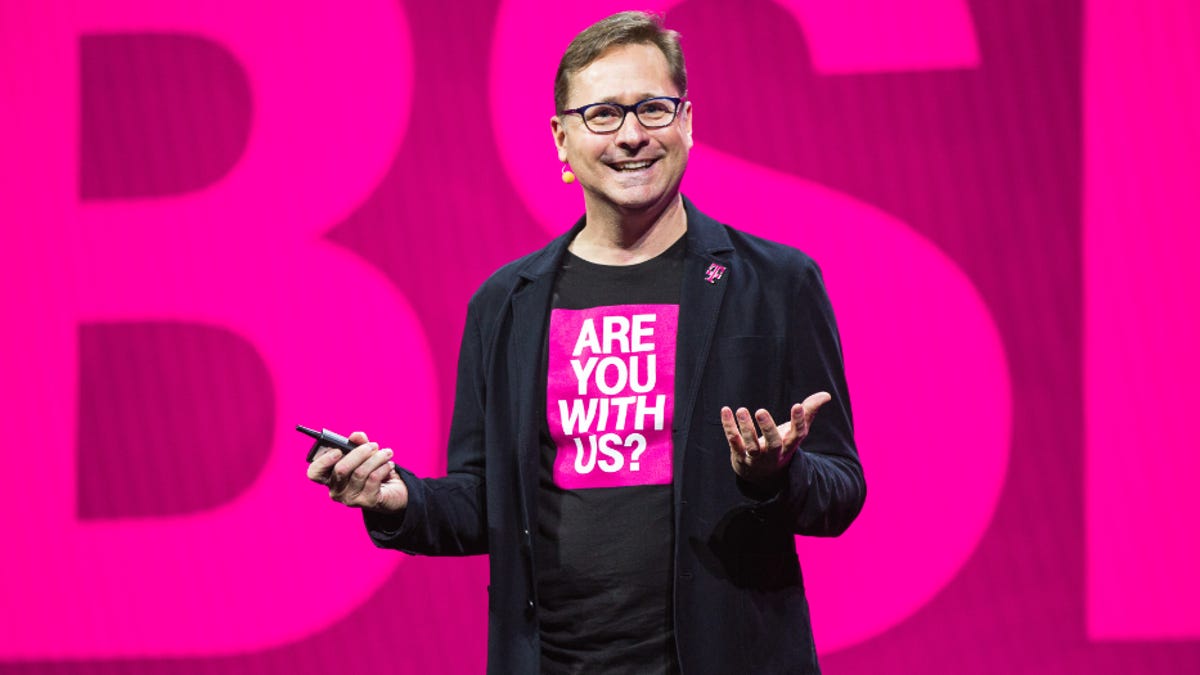T-Mobile sees subscriber gain after absorbing Sprint amid coronavirus pandemic
The results offer the first glimpse into how the newly combined carrier will deal with the COVID-19 crisis.

T-Mobile CEO Mike Sievert.
T-Mobile spent two years working to seal its acquisition of Sprint . Now that the deal is closed, we get our first glimpse of what the combined company looks like, whether Sprint's losses will weigh down the Un-carrier and how it's dealing with the global pandemic.
T-Mobile on Wednesday reported its first earnings since closing its prolonged merger with Sprint, the newly expanded carrier revealing where it stands as it gears up to challenge US leaders Verizon and AT&T .
Spoiler alert: It's doing just fine.
In its first-quarter earnings, the self-proclaimed "Un-carrier" added 777,000 subscribers, 452,000 of whom were postpaid phone additions. Keep in mind, these results reflect the period before the Sprint deal closed on April 1. The company boasted that the results marked the 25th straight quarter in which T-Mobile led the industry in postpaid phone additions.
Postpaid subscribers, who pay at the end of the month and are valued more highly by the investment community as a key metric for success, saw an increase despite the coronavirus pandemic.
The earnings arrive as the pandemic continues to wreak havoc on the US economy, forcing Americans to stay at home and the carriers to shut down their retail stores. Around the world, COVID-19 has already infected more than 3.7 million people and has led to more than 260,000 deaths.
Coronavirus updates
This difficult period also comes amid a shift in T-Mobile's leadership, with longtime executive Mike Sievert taking over the CEO position from firebrand leader John Legere.
Legere, who was originally expected to stay on until May 1 but passed the baton over when the Sprint deal closed, also stepped down last month from T-Mobile's board.
Revenue for the quarter, most of which occurred before lockdowns were declared across the US, came in at $11.11 billion, lower than the $11.4 billion analysts polled by Yahoo Finance estimated. Earnings per share were $1.10, higher than the $1.03 analysts estimated.
Similar to other companies T-Mobile did not put out full-year guidance during its earnings release, citing the uncertainty caused by the pandemic. As a result of the pandemic the company said it expects to add between "zero and 150,000" postpaid subscribers in the second quarter, with guidance for the full-year promised to arrive in the company's second-quarter earnings call.
T-Mobile also plans to complete its divestiture of Sprint's Boost Mobile prepaid offering to satellite TV provider Dish Network, one of the requirements imposed by the Department of Justice to get the merger approved, during the quarter.
Braxton Carter, T-Mobile's chief financial officer, tells CNET that the company is planning to close the transaction "hopefully in June" adding that "everything appears to be completely on track."
With Sprint now in the fold, T-Mobile has started to turn its attention toward improving its 5G network, beginning the deployment of midband spectrum it acquired as part of the deal in Philadelphia. This spectrum will enhance the range and speed of its existing 5G service, as well as bulk up its indoor performance.
The carrier on Tuesday also officially turned on the spectrum in New York, with Neville Ray, T-Mobile's president of technology, telling CNET that the company is currently working on building the new network "across most major metros right now in one form or another."
It's on! Today, customers in NY on the Galaxy S20+ & Ultra are the first to have access to the FULL.LAYER.CAKE.
— Neville (@NevilleRay) May 5, 2020
✔ Low-band 5G
✔ Mid-band 5G
✔ mmWave 5G pic.twitter.com/mVov3X2Wh0
While not saying which cities would be next, Ray name-dropped Los Angeles, Chicago and "down in Florida" as a few of the areas it's building out the new network adding that its "starting the machine on 2.5GHz buildout" across its network.
As is T-Mobile fashion, Ray took a shot at Verizon and its focus on using millimeter-wave, which has faster speeds but severely limited range compared to midband spectrum, for its current 5G network.
"I want Verizon to be chasing my tail for the next two/three years until they can get their hands on some realistic midband spectrum."

